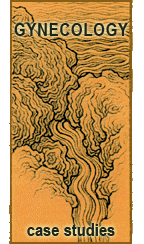Chinese Herbs and Acupuncture for Painful Periods

Chief Complaint: Period pain
Western Diagnosis: dysmenorrhea
Medical History: Patient was a young woman of healthy appearance. She is a student and works at a gym as a personal trainer. She is VERY active, and tries to eat healthily – mainly raw foods. She drinks eight glasses of water a day. The pain began about six months after starting her job at the gym. She also has considerable strain put on her through her studies, and her eating and sleeping can become erratic.
Questioning exam: The pain begins on the first day of her period and sometimes remains after the period has finished. It is a dull ache that radiates to the small of her back, and is worse when she sleeps at night – or when she just lies down. When asked she also experiences pain on the medial side of her left knee. Sometimes upon rising too quickly she feels dizzy. Urine is pale and frequent, although she does drink a lot of water. Her menses are light (colour and amount), with occasional clots, lasting four days. The pain responds well to pressure and warmth, esp. on her back. Vivid dreams but otherwise normal sleep. Defecation normal. Dull occipital headaches, but only occasionally.
Pulse exam: Pulse quality is generally deep and thready, and can barely be palpated in the chi position. Upon palpation the abdomen feels cool, with some guarding over the liver, the lower back is also cool and the muscles seem to lack strength.
Tongue exam: The tongue appears normal. It is pink with a thin white coat. On closer inspection the coat thickens slightly at the root, and the body is a little pale.
OM Diagnosis: As the pain occurs DURING and AFTER the period, this suggests deficiency, as does the scanty flow, and the relief vhealthportal.com/product/zyloprim/ offered through warmth and pressure. The scanty flow would suggest a blood AND qi deficiency. The back and knee pain, the dizziness, and the headaches point to the Kidney suffering some impairment, and the liver would also be expected as it regulates the menses, and abdominal palpation showed some organ distress through the muscle guarding. Her lifestyle and eating habits are also depleting her jing if she is not eating always correctly, and stress from study could also be compounding her physical problems.
Treatment Principle: Replenish the Qi, and tonify the Liver and Kidney organs to adjust menses and relieve pain.
Point Prescription: First: Sp6, Cv4 (warm-needling), St36, Kd3
then: Bl17, Bl20, bl23, bl18, (to reinforce the organs and for the yang effect of the back shu).
Herbal Formula: zou gui wan
Lifestyle Prescription: She was drinking all that water chilled – so drinks at room temperature or warmer. No raw food (or very little if she can help it). No more wearing jeans that leave the lower stomach and back uncovered. add ginger to her cups of tea and/or cooking. try to relieve stress and not over-exercise.
Results: Vast difference to pain and energy levels (which she hadn’t complained of initially and thought were fine). Kidney pulse now palpable. General pulse quality not as good as it should be.
Synopsis: This young woman found it hard to understand why her ‘healthy’ lifestyle had caused her such problems. Like most people her age she was the victim of western misinformation with regards to consuming raw foods and excessive exercising, and western fashion with inappropriate clothing (a less important point obviously). It was hard for her to change the habits of a lifetime (and a culture) but the obvious change in her health and energy levels were enough of an incentive.
 Last modified: September 8, 2009
Last modified: September 8, 2009  Posted in: Gynecological
Posted in: Gynecological
